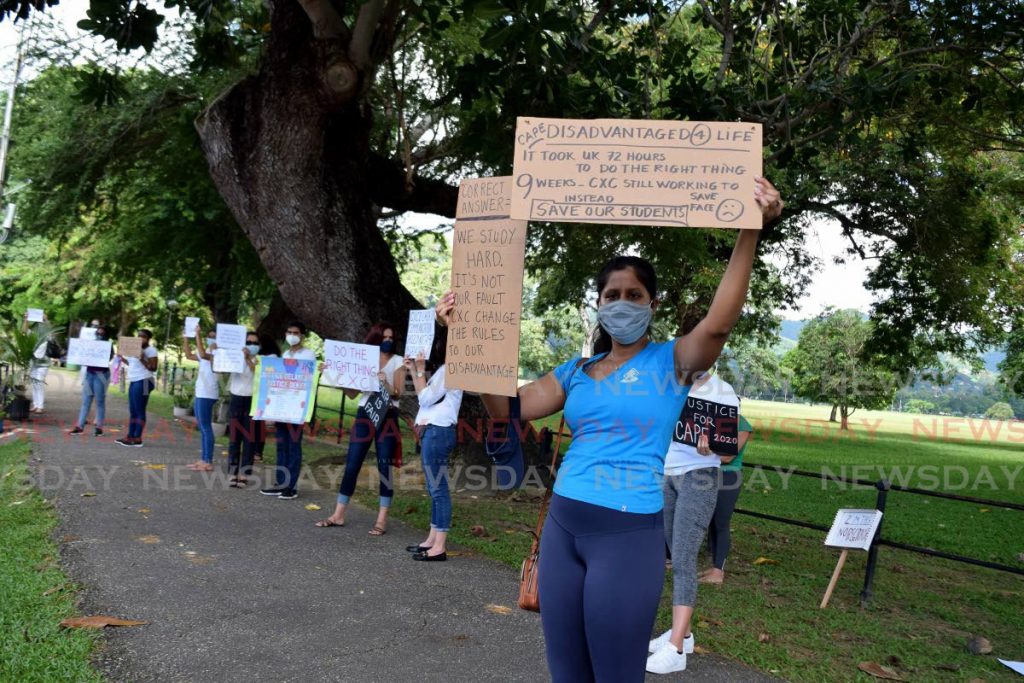Protesters across the region join forces against CXC

Teachers, students, and parents across the region have banded together in their fight against the Caribbean Examination Council (CXC) over Caribbean Advanced Proficiency Examination (CAPE) and Caribbean Secondary Education Certificate (CSEC) grades.
The Caribbean Coalition for CXC Exam 2020 Redress held a regional press conference on Thursday.
Students across the region were left outraged by what they say was an unfair assessment of their work, igniting protests in Barbados, Guyana, Jamaica and Trinidad and Tobago.
In his address Dr Michael Clark of Barbados, invited by the coalition as an independent education consultant, said the two most significant changes made by the council – the exclusion of paper 2 and changes to the moderation process – resulted in an exam that was no longer reliable, valid, or fair.
Reliability, he said, refers to the “consistency of scores across replications of a test regardless of how this consistency is tested or recorded.” He added that without score reliability there cannot be validity.
He said the executive summary of the independent review team – convened by CXC to review the moderation process used by the council – said an exercise carried out by the council with and without paper two and using data from previous years highlighted “limitations in the model.”
He said the exercise revealed a shift in the distribution of grades from a one to a four.
He said it was clear the removal of paper two affected the performance of students who would have excelled on that paper.
“This phenomenon is well known. It is referred to as grade compression.”
He said in paper two, otherwise known as the long paper, students explain their reasoning.
“Students who have a deep understanding of the tested construct but are lured by good distractors on the multiple choice have a chance to demonstrate their knowledge in this paper and improve their overall scores.
“Conversely, students without a deep understanding of the tested construct, but who were lucky in their choices on the multiple-choice assessment, will see their scores eroded here.”
He said because the US College Board was concerned about grade compression, it used only the equivalent of CXC’s paper two for its Advanced Placement (AP) test this year.
“Grade compression is something that must be examined very closely,” he said, adding it was further complicated by changes in protocol and extended moderation in one of the two remaining papers.
“I cannot accept that this process was fair.”
He said the council should consider having students, if they choose, do paper two and weigh the results with their current grade.
“If students can demonstrate a deep understanding of the tested construct, it would be unconscionable to allow an error in assessment to derail their academic progression.”
He said if students are happy with their grades, they should be allowed to keep them.
The coalition also advocated for CXC to “release in its entirety, the mechanism or method used to compute (students) grades.”
In a statement also released on Thursday, the coalition said, “CXC needs to make known cut-off scores for 2020 in relation to other years so that stakeholders may better understand how it made allowances to ensure that this year’s marking did not disadvantage students already disadvantaged by the onset of a devastating pandemic.”
It said not even the independent review team had access to this information.
“We wish to underscore that the cases outlined are real and meant to demonstrate the sincerity and urgency in our cause. Real people are being affected and we think that CXC has the capacity to handle this much better.”
Principal of Fatima College Fr Gregory Augustine said he is still hopeful the council will do the right thing.
“These are the top performers of the region,” he said. “That has to be taken into consideration.”
He compared overall grades over the past three years, which he said represented a significant decrease in grade ones. In computer sciences, he said, in 2018 40 per cent of students received grade one. In 2019 it was 50 per cent, but in 2020 only 14 per cent of students received grade ones.
CAPE Unit one student of St Francois Girls' College Adela Scotland said she has taken on the responsibility of talking to “suicidal students” across the region.
“The students of the region are in crisis, and CXC continues to play games with our futures,” she said.


Comments
"Protesters across the region join forces against CXC"